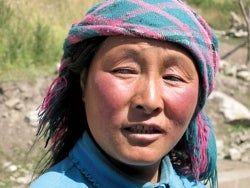Negar Omidakhsh (PhD ’17) hadn’t yet turned 2 when her parents brought her and her older brother to Canada as refugees. They had fled Iran in the aftermath of the 1979 Islamic Revolution — losing almost all of their money to smugglers in the process — so that Omidakhsh’s father could receive a university education. Growing up, Omidakhsh watched with admiration as her parents worked tirelessly to learn a new language and obtain college degrees.
WHILE WORKING AT THE BLACK AIDS INSTITUTE in Downtown Los Angeles, Rebekah Israel Cross heard from people who expressed a lack of interest in pre-exposure prophylaxis (PrEP) for HIV prevention despite being at greater risk of contracting HIV. Their reasoning, Cross explains, is PrEP would do nothing to address violence in their community and day-to-day lives or to eliminate systemic sources of oppression that hinder health and well-being.
OF THE 30 DEADLIEST MASS SHOOTINGS in the U.S. since 1949, the majority have occurred in the last decade. The horrific scenes are etched in our national psyche — from an elementary school in Newtown, Connecticut, a high school in Parkland, Florida, a church in Charleston, South Carolina, an outdoor concert in Las Vegas, and a nightclub in Orlando, Florida, among others.
FOR THE TEACHERS IN THE LOS ANGELES UNIFIED SCHOOL DISTRICT elementary school classrooms that participate in Generation Xchange (GenX), the middle-age and older adults who spend at least 10 hours a week providing academic assistance and support to struggling students are a welcome addition, to say the least.
“One of the saddest things was just how many of these survivors did not believe their own experience was domestic violence.” — Dr. Chandra Ford
RECENT DATA ON INTIMATE PARTNER VIOLENCE in the United States indicates that the risk is declining for women, who make up the majority of victims. According to the U.S. Department of Justice, the rate of intimate partner violence dropped by more than two-thirds between 1994 and 2012.
NATIONALLY, CHINA’S EFFORT OVER THE LAST SEVERAL DECADES to reduce maternal mortality rates by promoting hospital deliveries has been highly successful. From 1990 to 2011, maternal mortality rates declined an average of 5.7 percent per year, far greater than the average declines for low- and middle-income countries over the same period.

THE DISCOVERY IN THE 1980s linking the human papillomavirus (HPV) to nearly all cases of cervical cancer led to the groundbreaking development of a cancer-prevention vaccine, approved for use in females in 2006 and for males in 2009. The U.S. Centers for Disease Control and Prevention (CDC) now recommends that the HPV vaccine — which can prevent cervical, anal, vulvar, vaginal, penile and certain throat cancers, as well as genital warts — be offered routinely to adolescents and young adults ages 11-26.
“Women and adolescents are often underrepresented at the policy table.”
— Dr. Corrina Moucheraud
“As community health workers we can be allies, helping people navigate the process.”
— Anna-Michelle McSorley
WHEN ELIZABETH (BECKY) YANO, MSPH ’87, PhD ’96, BEGAN HER TRAINING in epidemiology,